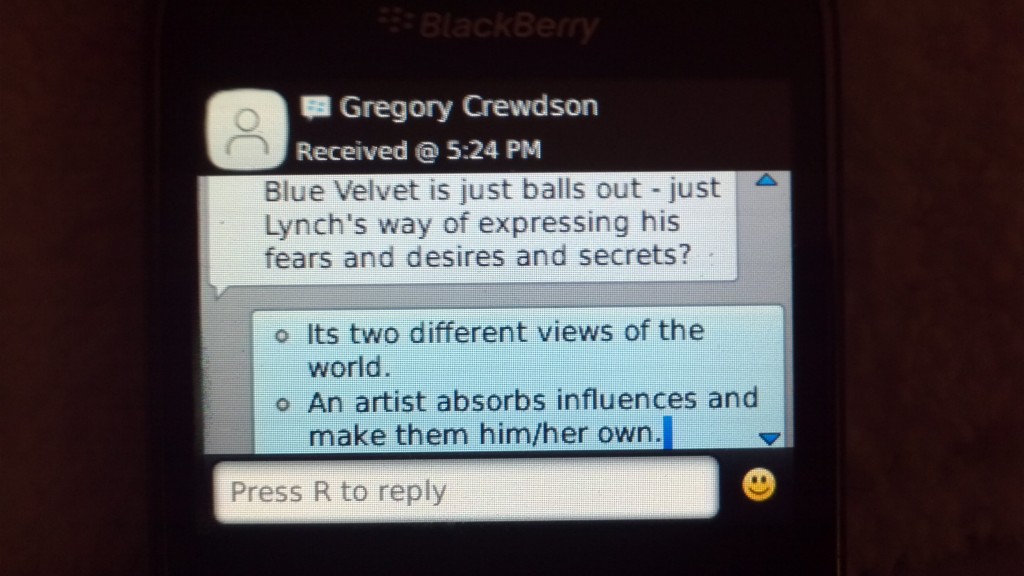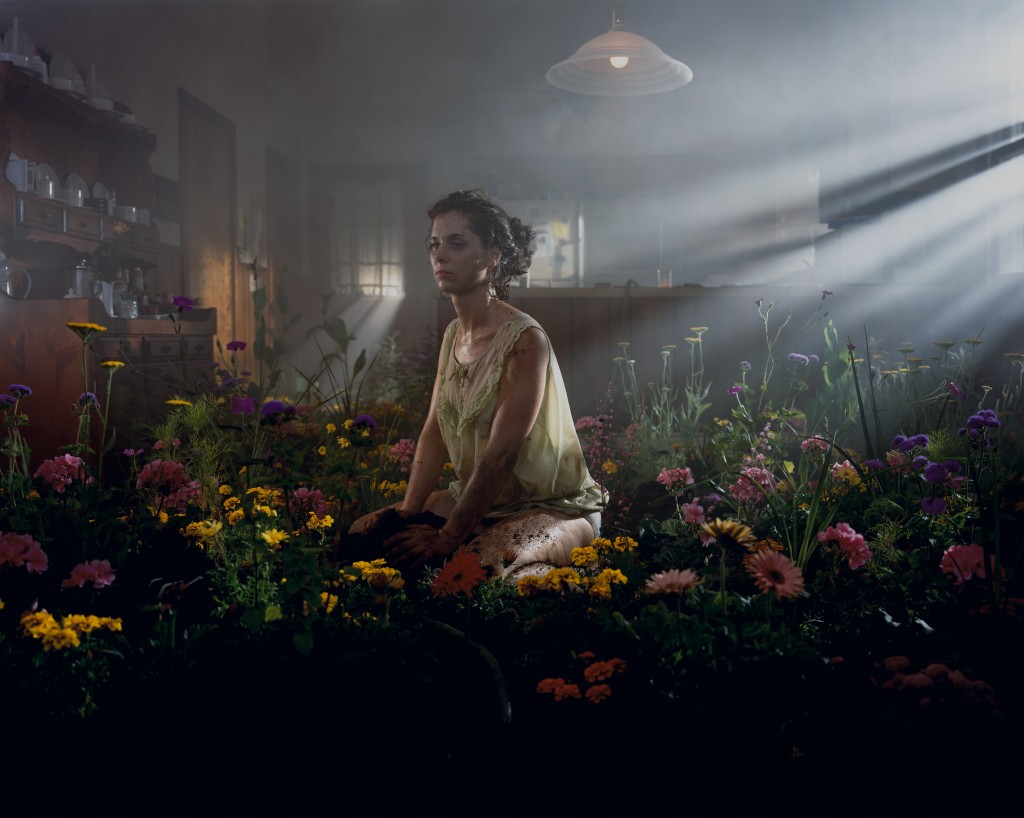“Gregory Crewdson: BBM Encounters” by Ali Tenenbaum
|
I “sat down” with Gregory Crewdson via BBM (yes we are in the club of dwindling but highly devoted and loyal users of the black berry) and talked about his work, Blue Velvet and movies that change your life. Ali: I looked you up on Wikipedia and it says in there that your work is dramatic and cinematic. I think we should focus on the cinematic and we’ll see where this goes. You have said many times that Blue Velvet was very influential for you. 1) Can you confirm or deny this and B) do you remember the first time you saw Blue Velvet? What theater? What state of mind etc. Gregory: Blue Velvet was a hugely important film for me. I first saw it when I was an MFA student at Yale in 1986. I was already very interested in exploring the underside of the American vernacular. However, the film had a big impact on my work. Ali: Did you have a moment where you walked out of the theater and said to yourself, holy crap, that’s major? Or can you describe how you recognized that feeling as it relates to creating your stuff. Gregory: There is the list of the great movies of all time. And then there is the list of movies that changed your life. Blue Velvet changed my life. It was an uncanny experience. It felt somehow familiar and strange at the same time. And it directly changed my view of the world. Ali: Yes, the life changing movies, are much more interesting than the objectively “good” movies because of the baggage you bring to it with the first viewing that you aren’t even aware you have and the baggage you leave with and carry around for a lifetime. Can you talk about the baggage you brought going into that first time seeing the film – you mention you “were already interested in the underbelly Americana (paraphrasing).” Where did that come from? Gregory: I was always influenced by a particularly American tradition of art making that searches to find an intersection between ordinary life and theatricality. The painting of Edward Hopper and Norman Rockwell. The photographs of Walker Evans, Diane Arbus, William Eggleston. The short stories of Raymond Carver and John Cheever. Blue Velvet fits squarely within this tradition. The tension between ordinary life and something mysterious and unknown. I also related to Jeffrey Beaumont. His quality of being there, but not there. His voyeuristic impulse to peer in on forbidden secrets. Ali: Yes and he is constantly referring to that part of himself – “I am in a mystery, or it’s all a secret” etc. Does JB have to peer secretly because he is so controlled he lives vicariously through the mysteries he is uncovering? Or does he explore the “abnormal” in order to feel more normal himself? And by JB I mean you J Gregory:Good Question The scene where he is hiding in the closet watching Dorothy Vallens and Frank Booth perform their S&M sex ritual is key. It reminds me of myself listening through the floorboards to my father’s sessions. There but not there. The camera is an alibi. It gives you a license to explore the secret and the forbidden. Ali: Yes and he clearly is more intrigued than your average on looker. Or is he? Maybe that’s the point – that if we all let ourselves go to that place we would be alternately aroused and disgusted because it’s simply human nature? Gregory:You are asking the wrong person… We all have secrets. We all have our particular fears and desires. Ali: What’s interesting to me about your work and the difference between it and the expression of art that is Blue Velvet is that your pictures have the sense that something terrible or important has just happened or is about to happen – but what that is remains unknown. Blue Velvet is just balls out – doesn’t leave much to the imagination – maybe just Lynch’s particular way of expressing his own desires and secrets? Gregory: It’s two different views of the world. An artist absorbs influences and makes them his/her own. It’s what the artist does. Takes various conventions and reinvents them. I think I am more interested in a psychological tension that is less literal or knowable. In the end almost nothing happens in my pictures. It’s about the moment in between the moments. Not the moment itself. It’s one of the big distinctions between film and photography. Photography is, by nature, an ambiguous medium. It’s not good at naming things directly. For me that limitation is strength. Ali:And ironically, your pictures feel very much like a film set. The first or last scene of a movie…I learned this by watching a new film about you. How did you find the process of making a film or I should say of being the subject of a documentary. Gregory: During productions I barely realized that I was being filmed. So much going on. However, it was harder when I was location scouting. That is a much more private activity. Watching the film for the first time was very difficult. However, I am very pleased the film exists. It documents an important time in my life. However, I would not do it again. Ali: You say the scouting locations is more private – that seems to be where you get your inspiration, whether it comes from driving along the same road 50 times or seeing a character in town that strikes you – Ben captures this so well in the film. Gregory: Yes in some ways it’s my favorite part of the process. It’s truly a lone activity. And what I am after is so elusive. So particular. Open Ended. After the locations are chosen the process takes on it’s own energy. Ali: Did you know Ben Shapiro before he started shooting? I would imagine some major trust would have to be built up there… Gregory: He originally came to a production because he was a cameraman for a PBS art show. And then he asked if he could continue shooting the productions. So there was an established trust. However, there was also a necessary separation. Over the 10 years he documented the productions I never once asked to see the footage. I did not want to see it. Ali: Wow – a dream subject for him. He does an amazing job of capturing you, your process. We get a bird’s eye view that feels so incredibly intimate. Gregory:He had amazing patience and sensitivity. And that really comes through. He made a really great film. However, it is still painful for me to watch. Ali: I can imagine, but I highly recommend that others see it. That would be my advice to artists of every kind, go see Brief Encounters: Gregory Crewdson. What would your advice to young artists be? Please not ‘follow your dreams.” Gregory: Do what you have to do. Ali: Have you ever met David Lynch? Gregory: We have not met. I think that’s probably a good thing. Never meet your heroes. Ali: What other films are on your “changed my life” list? I will throw down The Breakfast Club, The Big Chill, Reds, Stranger Than Paradise and Grease. Not necessarily in that order. Gregory: Love your list. Mine is more predictable. Close Encounters Of The Third Kind, Night Of The Hunter, Vertigo, Rear Window, Psycho, Badlands Ali:Not so predictable because in ALL the years we’ve known each other (just a few) I didn’t know Hitch was your guy. Did you see The Girl on HBO or Hitchcock in the theater now? Gregory: Both films are flawed in that they insist on mythologizing their subjects. They just reinforce how great and mysterious the original films are. Hitchcock is my all time favorite filmmaker. Ali: Yes, The Girl was way too stylized – trying hard to be LIKE a Hitchcock movie. OMG this is the start of another interview entirely! Thank you so much for taking the time to talk to me. Brief Encounters is being screened at LACMA on January 24th Follow Ali Tenenbaum on twitter @themovieshark |

